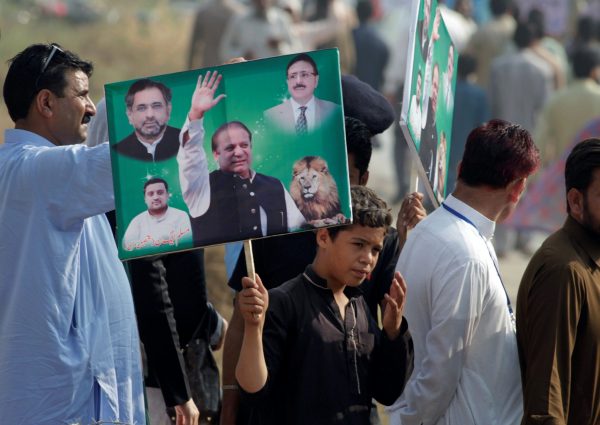Political commentators expected Sharif to be less confrontational this time around than when he was dismissed by president Ghulam in the 90s, and resign himself to completing his party’s five-year term. This would allow for a smooth transition for the next prime minister.
While the country’s political landscape has indeed changed over the past three and a half months, events have not transpired as predicted.
First, the ruling party’s narrative of a ‘judicial coup’ against Sharif by the all-powerful military establishment has gained prominence in the national media and public discourse.
Against this backdrop, Sharif and his ruling Pakistan Muslim League-Nawaz (PML-N) party successfully passed legislation in parliament allowing for a disqualified member to hold a party position, paving the way for Sharif to reassume his party’s leadership.
Sharif and his family are also using delay tactics against the accountability courts handling their indictment. And during one of Sharif’s hearings, the paramilitary forces (Rangers) stopped the Interior Minister (their boss according to the constitution) from entering the accountability court.
Second, the military is going against its constitutional mandate by involving itself in the country’s political affairs. It has openly expressed concern with the country’s poor economic situation, a move that many consider an indirect jibe at the ruling party’s inadequate economic performance.
Inter-Services Public Relations — the army’s media wing — has also conducted back to back press talks commenting on statements made by politicians.
For some, this is evidence that the military’s ‘gloves are coming off’. Whispers of a ‘potential military takeover through a technocrat setup’ are doing rounds in the power corridors of Islamabad. The military has rejected such speculation.
Finally, the political discourse, as a result of the NA-120 by-elections for Sharif’s seat, is slowly shifting towards the far right, with Pakistan’s Ahmadi (or Ahmadiyya) minority community currently in the line of fire, facing hate speech from retired Captain Safdar — Sharif’s son-in-law and a member of parliament.
On the face of it, these developments might seem mutually exclusive and merely symptomatic of a decades long civil–military tussle. But the common denominator that unites these developments is the disqualification of Sharif in the final verdict of the Panama Papers case.
Some argue that Sharif’s disqualification is a smokescreen for the infamous Dawn Leaks incident in October 2016 (a story published in the English daily Dawn News on 6 October that highlighted major rifts in the civil–military relationship on tackling militancy in the country). Not only did the story put a huge dent in the relatively smooth civil–military ties of the time, it also portrayed the military in a negative light both at home and abroad, leaving the army red faced. It was also in the aftermath of the Dawn Leaks story that the military started commenting on political and judicial matters in the country.
Since his ouster, Sharif has actively denounced his disqualification as a conspiracy hatched solely to bring his ‘popular government’ down. Where his critique of the apex court has been explicit, his critique of the military — whom PML-N devotees believe orchestrated Sharif’s disqualification through the courts — had always remained more indirect prior to the verdict.
Imran Khan — leader of the opposition party Pakistan Tehreek-e-Insaf — recently criticised the PML-N for trying to ‘malign the military’ by accusing it of having a ‘Dawn Leaks Agenda’.
But the by-elections in Sharif’s constituency of NA-120 in Lahore, where his wife Kulsoom Nawaz stood victorious, in retrospect, gives some credence to PML-N’s claims of the military’s alleged manipulation of the political landscape.
The presence of Hafiz Saeed’s Milli Muslim League (even though not cleared to contest polls) and Tehrik-e-Labaik Pakistan — an ultra-right group and supporter of ‘blasphemy killer’ Mumtaz Qadri — somewhat validate major reveals in the Dawn Leaks story regarding the military’s dealings with the likes of such groups.
Surprisingly, the military’s spokesperson recently suggested that ‘a proposal to politically mainstream militant groups’ was under consideration, in order to bring such elements into the national fold.
With the two right-wing parties bagging an overall 11 per cent of the vote in urban Lahore, a move to mainstream these parties would somewhat dent PML-N’s voter base in the 2018 general election.
With next year’s general election around the corner, the country is bracing for a further escalation of civil–military tensions. There is a prevailing sense in the country that the military, with its maligned history of staging coups, would not risk another hard or explicit takeover.
Even if that is the case, the next few months before the general election will set a course for Pakistan’s political future. Whether the PML-N successfully fends off the growing military influence, or succumbs to pressures pushing for a ‘military-influenced’ technocratic setup, only time will tell.
Farooq Yousaf is a doctoral candidate at the University of Newcastle.

